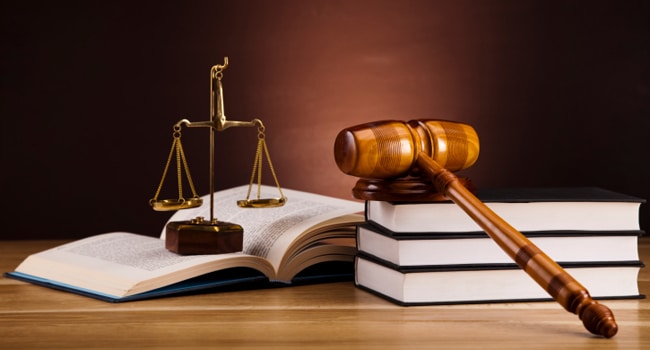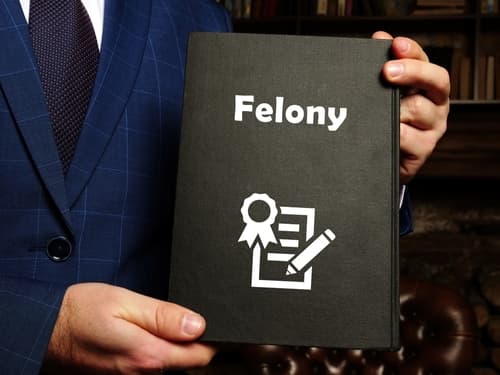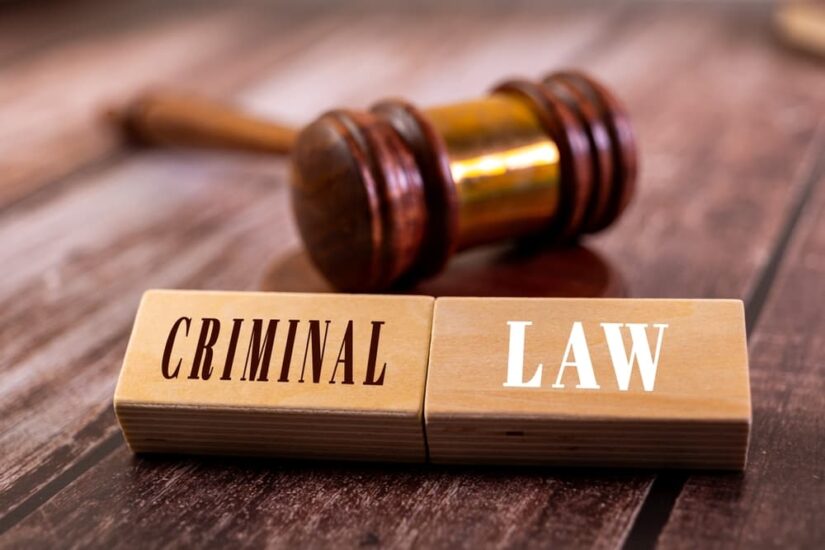What Is the Difference Between a Felony and a Misdemeanor in Florida?

If you’re facing a criminal charge, it helps to understand if it is a felony or misdemeanor. These two classifications often result in different penalties and consequences. Misdemeanors are generally less severe and may result in lighter sentences, such as fines or short jail terms, and sometimes more favorable outcomes, like diversion programs. Felonies result in lengthy prison terms, loss of civil rights, and lasting impact on your future.

Whether you’re charged with a felony or misdemeanor, the stakes are high, and proper legal representation can make a difference. A skilled criminal defense attorney in Florida can evaluate your case, negotiate with prosecutors, and work to dismiss or reduce the charge.
What Is the Difference Between a Misdemeanor and a Felony Charge
The two classifications of criminal charges can impact your rights, future, and the potential penalties you may face.
Here are the differences between a misdemeanor and a felony charge:
Severity of the Crimes
The main variance between a misdemeanor and a felony charge lies in the severity of the crime committed. Misdemeanors are considered less serious offenses, often resulting in less severe penalties such as fines, community service, or a maximum of one year in county jail.
On the other hand, felonies are more serious crimes that can lead to imprisonment in a state or federal penitentiary for a year or more, depending on the details of the case.
Legal Process
The legal process for misdemeanor and felony charges differs. Due to their less complicated nature, misdemeanor cases are typically processed more swiftly through the court system.
In contrast, felony cases require more extensive legal procedures, including preliminary hearings, grand jury indictments, and potentially lengthy trials. They therefore result in prolonged court proceedings and complicated legal defense strategies.
Consequences
The consequences of a felony conviction extend far beyond the immediate penalties imposed by the court. Felonies often carry long-lasting collateral consequences that can impact your life, such as your employment opportunities, housing options, professional licenses, and civil rights.
While misdemeanors can still have negative repercussions, they generally carry fewer long-term consequences than felony convictions.
Social Stigma
The stigma associated with a felony conviction is much more severe than that of a misdemeanor. A felony record can impact your social standing, reputation, and relationships with others.
Employers, landlords, and educational institutions scrutinize felony convictions more closely, leading to potential discrimination or exclusion from specific opportunities.
On the other hand, while a misdemeanor may still raise concerns, it is generally viewed as a less severe offense that is easier to overcome with quality legal representation and rehabilitation efforts.
Misdemeanor vs Felony Examples
Here is a comparison of misdemeanors and felonies using examples:
Potential Punishment
The potential punishment for misdemeanors versus felonies varies significantly. Misdemeanors typically carry lighter penalties, such as fines, community service, probation, or a maximum of one year in jail.
On the other hand, felonies involve more severe consequences, including a minimum of one year in state prison, hefty fines, or even life imprisonment. For instance, a first-time DUI offense in Florida is classified as a misdemeanor, leading to fines and suspension of driving privileges.
In contrast, a repeated DUI offense with serious bodily injury can escalate to a felony charge, resulting in significant prison time.
Impact of Criminal Record
The impact of a criminal record differs between misdemeanors and felonies. A misdemeanor conviction may affect employment opportunities or professional licenses, but it generally carries less stigma than a felony on one’s record.
In contrast, a felony conviction can have long-lasting consequences, such as loss of voting rights, gun ownership restrictions, and limited career prospects.
For example, possession of a small amount of marijuana for personal use may result in a misdemeanor charge and a fine. In contrast, trafficking or distribution of controlled substances can lead to a felony conviction with severe penalties.
Legal Process
The legal process for misdemeanors versus felonies follows distinct procedures. Misdemeanor cases are typically handled in county courts and may involve a quicker resolution than felony cases, which are tried in circuit courts and require more extensive proceedings.
The complexity of evidence, the involvement of grand juries, and the potential for plea bargaining often vary between misdemeanor and felony cases.
For instance, a simple assault or shoplifting incident might be resolved swiftly in a misdemeanor case, with a homicide or armed robbery allegation requiring a more intricate legal process as a felony offense.
What Is the Most Common Punishment for a Felony
The most common punishment for a felony in Florida is incarceration in a state prison. Unlike misdemeanors, which typically carry lighter sentences in county jails, felonies often result in longer prison terms due to the severity of the crime.

You should understand the distinction because a felony conviction may have a lasting impact on various aspects of your life, from employment opportunities to your reputation in the community.
Fines are another common punishment for felonies in Florida. These financial penalties can be substantial, further adding to the consequences of a felony conviction. In some cases, individuals may also face probation as part of their sentence, requiring them to adhere to specific conditions set by the court.
Overall, the combination of prison time, fines, and probation underscores the serious nature of felony offenses. However, working closely with a criminal defense lawyer can lead to a favorable outcome.
A skilled Florida criminal defense attorney can help you understand the charges against you, analyze the evidence, and develop a strategic defense strategy tailored to your case. They can protect your rights, pursue the best possible outcome for your situation, and work towards securing a brighter future.
Common Felony Charges
Here are the common felony charges in Florida:
- Drug Possession: Possessing illegal drugs such as cocaine, heroin, or methamphetamine can lead to felony charges. Depending on the type and quantity of drugs found in your possession, you can face severe penalties, including lengthy prison sentences and hefty fines.
- Burglary: Breaking into a dwelling, structure, or conveyance with the intent to commit a crime inside constitutes burglary. The burglary felony offense carries substantial penalties, especially if the burglary involved a residence or if a weapon was used during the commission of the crime.
- Assault: A serious physical or verbal threat that puts someone in fear of imminent harm can lead to assault charges. Aggravated assault, involving a deadly weapon or the intent to commit a felony, is a more severe offense with harsher consequences.
- Robbery: Unlike burglary, robbery involves stealing from someone using force, violence, or threats. Whether armed or unarmed, a robbery is a felony offense that can result in significant jail time and fines.
- Grand Theft: Stealing property valued above a certain threshold, typically $750 or higher, constitutes grand theft. Depending on the value and nature of the stolen items, grand theft can result in felony charges and serious repercussions.
- Domestic Violence: Acts of violence or abuse committed against family or household members fall under domestic violence offenses. Repeat offenses or incidents involving serious bodily harm can lead to felony charges and extensive legal penalties.
- Fraud: Engaging in deceptive practices to obtain money or property unlawfully constitutes fraud. Whether it involves insurance fraud, credit card fraud, or identity theft, committing fraud can lead to felony charges and substantial consequences.
- Homicide: The most serious of criminal charges, homicide involves unlawfully causing the death of another person. Depending on the circumstances surrounding the death, homicide charges can range from manslaughter to first-degree murder, carrying life imprisonment or even the death penalty.
- Kidnapping: Unlawfully confining, abducting, or imprisoning another person against their will constitutes kidnapping. Kidnapping, a felony offense, can result in significant prison sentences, particularly if the victim is a minor or if the kidnapping involved ransom demands.
- Sexual Assault: Non-consensual sexual contact or intercourse with another person constitutes sexual assault. Perpetrating such acts can lead to felony charges, lifelong registration as a sex offender, and severe legal consequences.
Florida Misdemeanor Charges
Here are examples of misdemeanor charges in Florida, along with their potential consequences:
- DUI (Driving Under the Influence): Driving with a blood alcohol level above the legal limit of 0.08 percent can result in a DUI charge. Penalties may include fines, license suspension, and even jail time.
- Domestic Violence: Charges of domestic violence involve acts of violence or abuse against a family or household member. Consequences may include restraining orders, mandatory counseling, and potential jail time.
- Assault: Physically threatening or attempting to harm someone can lead to an assault charge. Penalties for assault may include fines, probation, or even jail time.
- Shoplifting: Taking merchandise from a store without paying for it can result in a shoplifting charge. Consequences may include fines, restitution to the store, and potential community service.
- Disorderly Conduct: Engaging in disruptive or unruly behavior in public can lead to a disorderly conduct charge. Penalties may include fines, probation, or even a short jail sentence.
- Trespassing: Entering or remaining on someone else’s property without permission can result in a trespassing charge. Consequences may include fines, probation, or even a restraining order.
- Drug Possession: Possessing illegal drugs or controlled substances can lead to a drug possession charge. Penalties may include fines, probation, drug education programs, or jail time.
- Petty Theft: Stealing items of minimal value can lead to a petty theft charge. The consequences may include fines, restitution to the victim, and potential community service.
- Criminal Mischief: Damaging or defacing property belonging to someone else can lead to a criminal mischief charge. Penalties may include fines, restitution to the property owner, and potential probation.
- Prostitution: Engaging in or offering to engage in sexual acts in exchange for money can result in a prostitution charge. Consequences may include fines, mandatory counseling, and potential jail time.
Although facing a felony charge is a daunting experience, the input of a criminal defense lawyer can give you peace of mind. A criminal defense attorney can explain the consequences of your charge, negotiate reduced penalties, guide you, and help avoid jail time, fines, or a permanent criminal record.
How Can a Criminal Defense Lawyer Help Me
A skilled Florida criminal defense attorney can hold your hand so you’re not overwhelmed by a felony or misdemeanor charge. Here are three ways they can support you:
Legal Guidance
Facing a criminal charge can be overwhelming for anyone without a legal background.
A criminal defense lawyer can use their knowledge and experience to guide you through the legal process.
A criminal defense attorney will ensure you understand your rights, the charges against you, and the potential consequences you may face. They will be your advocate, providing support and advice so you can make appropriate decisions in the claim.
Defense Strategy
An experienced criminal defense lawyer can develop a strategic defense tailored to your circumstances. Effective legal representation involves more than just showing up in court; it requires careful analysis of the evidence, witness testimony, and other factors that can impact your case.
A criminal defense attorney will work diligently to build a robust defense, identifying weaknesses in the prosecution’s case and presenting compelling arguments in your favor.
Negotiate With a District Attorney
A Florida criminal defense lawyer can negotiate on your behalf to potentially reduce charges or penalties. Through skillful negotiation with the prosecution, a criminal defense attorney can secure a plea deal that minimizes the consequences you face.
Whether negotiating a reduced sentence, securing probation instead of jail time, or exploring alternative sentencing options, they will work tirelessly for the best possible outcome.
Don’t Face Criminal Charges Alone
A conviction, whether felony or misdemeanor, can lead to a jail term, heavy fines, a permanent criminal record, and the loss of your rights and reputation. With legal support, you risk making costly mistakes, missing deadlines, or accepting unfair plea deals.
An experienced criminal defense attorney understands the Florida legal system and can protect your rights by building a strong defense. From investigating your case to negotiating with prosecutors, a Florida criminal defense lawyer is your strongest advocate when your future is on the line.
Contact a criminal defense attorney to protect your legal rights.
